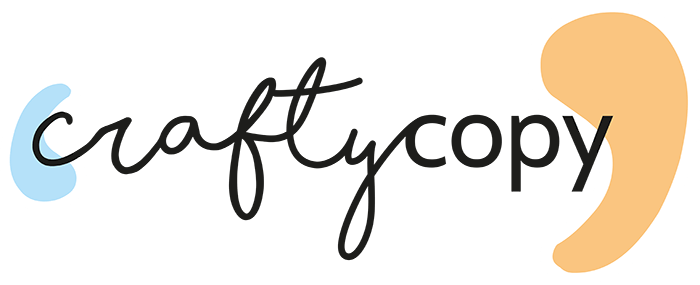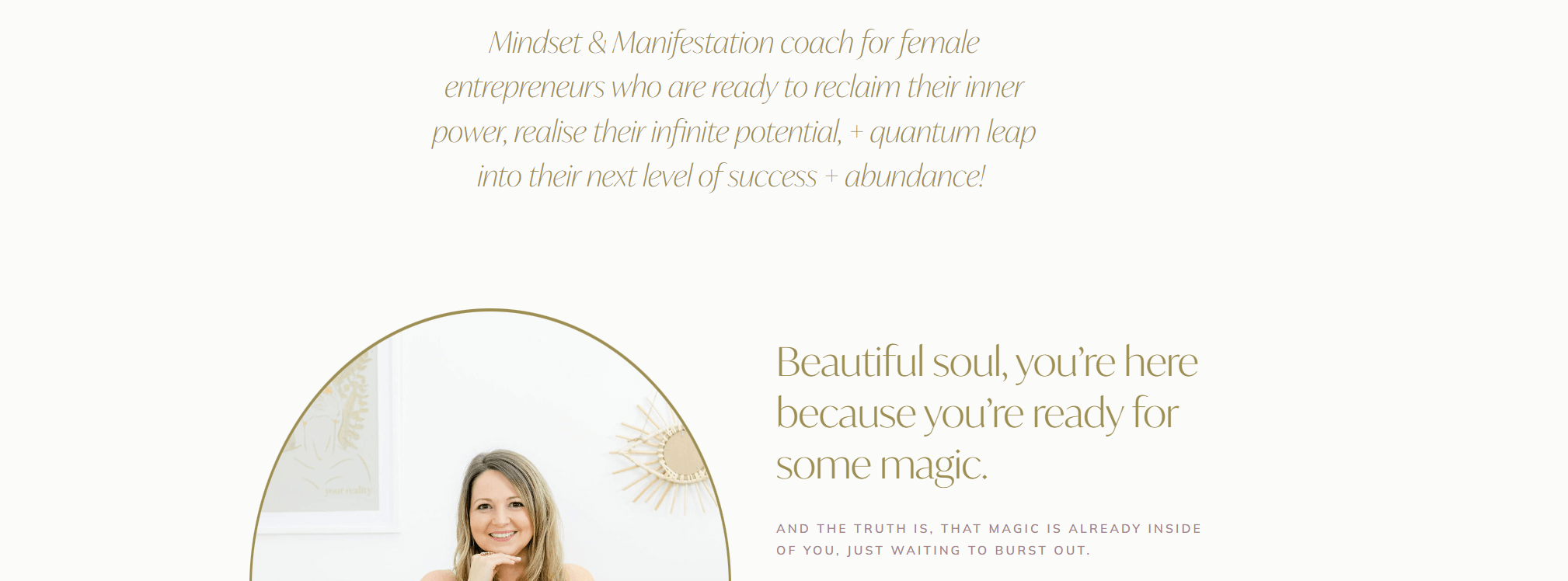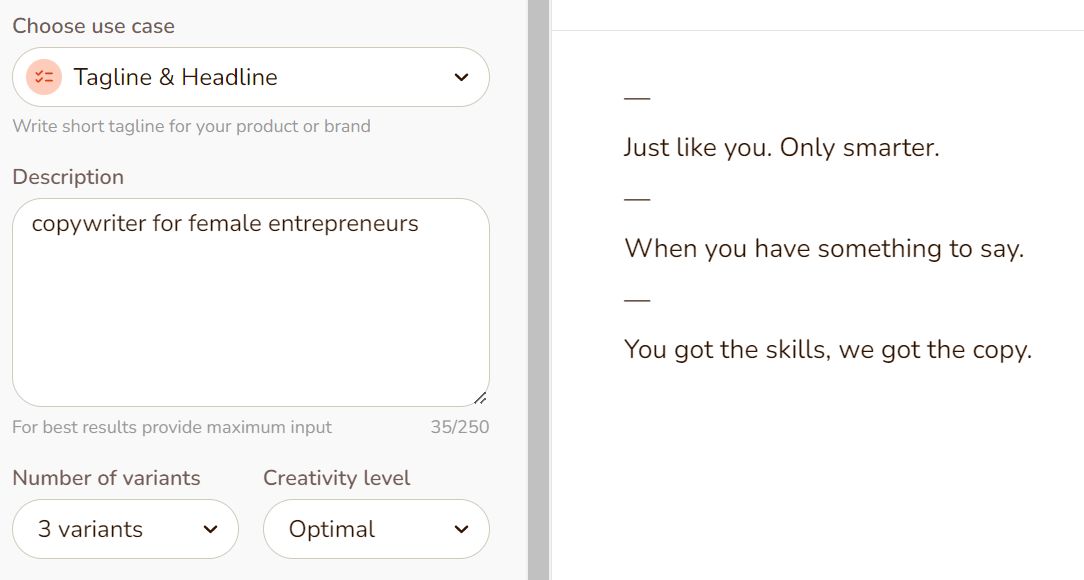7 Reasons Why You’re Not Getting Clients (& How to Fix Them)
And relax: it's unlikely to be because of your actual skills! So, here's exactly what to do about the most common reasons why you're not getting clients.
As a service provider, you’re INCREDIBLE at what you do. So…why are you not getting clients? Or better: why are you attracting the wrong-fit prospects and not as many dream clients as you’d like?
Here’s the truth bomb:
at this stage, it doesn’t matter how good you are at what you do. If you can’t attract your target audience and convert them from prospects to clients, they’ll NEVER find out.
That’s where your problem is likely to be!
So, we’re going to look at 7 common reasons why you’re not getting clients and, most importantly, what you can do to fix them.
But let’s double-check something real quick.
Disclaimer: you first need to have the right foundations in place!
In some cases, there might be deeper and bigger reasons why you’re not getting clients, and they require your attention before you fix any of the ones we’ll look into in the core of the article:
You don’t know who your dream audience is. If you’re tempted to answer “but my services are for everyone”, then hear me out: when you try and please everyone, you please no one. So, take some time to look into this properly. Conduct some research, narrow down your audience, and understand exactly who you’re selling to
You haven’t got the right offer for your audience. Your services should solve your dream client’s pain point, offer a desirable transformation, and be priced accordingly. If your offer is something they can easily live without or it’s just too expensive for their budget (or even suspiciously cheap)… then that’s probably why you’re not getting clients. So, run a competitor analysis to see what’s already working out there, get some honest feedback from your target audience, and consider redesigning your services accordingly
Not sure if you’re targeting the right audience and with the right services? Easy:
Do you know of any competitors who’ve got similar services for your audience—and who’re doing well?
Have you sold your services before?
Did you receive positive feedback?
Do you get clients from referrals, occasionally?
If you’ve just answered “yes” to those, then… congrats: there’s nothing wrong with your actual audience focus and services (pheeew) and the rest of this blog post is indeed right for your current situation.
7 main reasons why you’re not getting clients for your service-based business—and what to do about it
And I’m confident it’s at least one of the following because that’s what most of my clients used to struggle with.
Full disclosure? I had the same problems in the past!
So, trust me: I know how frustrating it feels. Luckily for you, I now know how to solve them, too.
1. You’re not clear on your brand messaging
Your brand messaging is the way you write and talk about your business, the core topics you focus on, and how you convey your value proposition to your specific audience.
In other words, it’s what allows you to set yourself apart from your competitors and grab your dream client’s attention—and retain it.
Your brand messaging should also be consistent everywhere, from your website copy to your social media posts and… all your marketing materials
For example, does your website say “I’m a graphic designer on a mission” but your social media bios are “I offer graphic design services for solopreneurs” and your LinkedIn headline says “I’ve completed +100 graphic design projects and social media templates for my clients”?
Then your audience won’t be able to understand what your brand is actually about.
And if they can’t understand it, they won’t remember it.
And if they don’t remember it, they won’t automatically think of you when they’re finally ready to invest in a solution to their problem.
How to fix this reason why you’re not getting clients:
You can start by brainstorming exactly:
What you do/what type of business you are
Who for
How this benefits them/why they should care
and then keep this focus and precise wording consistent across all your marketing materials.
2. You’re not welcoming your dream audience into your brand story
Storytelling in marketing can get you a 30% increase in conversions. Only when done right, though!
Is your brand story all about yourself and how passionate you are about your business?
Do you post content that focuses on you and whatever you’re “excited to announce” and “delighted to share”?
Then that’s likely to be one of the main reasons why you’re not getting clients.
I’ll tell you a secret: people are selfish. We all are. And that includes your target audience. So, if you keep talking about yourself and your business, they won’t care.
But you know what they LOVE hearing and reading about?
Themselves (told ya they’re selfish).
So, adjust your brand story accordingly.
How to fix this reason why you’re not getting clients:
Place your dream client at the core of your brand story, connect with their pain point, position yourself as the best person to solve it, and make them feel this transformation.
Your website copy can tell the entire story, and your content can amplify it.
So, make sure most of it is about your dream clients. Less “I/we”, more “you.”
3. Your website copy isn’t optimised for conversions
One of the most common reasons why service providers don’t get clients? Because their website copy doesn’t actually sell their services. It just describes their business.
“We offer x, y, and z.”
“We’d love to hear from you.”
“We are passionate about working with…”
Does this sound familiar? In most cases, it’s because you wrote your own copy or outsourced it to the cheapest copywriter you could find.
And hey, it’s ok: we’ve all gotta start somewhere! However…
Your website copy should actively be generating high-quality leads for you. If it hasn’t been doing that, then it sounds like it’s time to upgrade it.
For example, amongst the various conversion elements it must include, there’s tackling your dream client’s objections. Maybe they’re considering investing in your services but are thinking “or I could just do it myself.” If your website copy doesn’t address this objection, those prospects will leave without getting in touch—and try and do it themselves.
How to fix this reason why you’re not getting clients:
Invest in conversion-focused website copy that’s written with an actual strategy and that actively sells for you (24/7, no breaks or holidays allowed).
4. You’re not relying on SEO
Most of your dream clients don’t know about your business or name, but they are out there looking for a solution to their problems and googling your type of services.
If you don’t show up on Google at all, that’s probably why you’re not getting many clients: they’re finding your competitors instead!
How to fix this reason why you’re not getting clients:
When you invest in new website copy, make sure it’s optimised for search engines as well as for conversions. This will give you the best chances of attracting your dream audience organically on Google
Blog on your business website. Your core website pages will help you attract prospects who’re looking to invest in your types of services, but 95% of your audience are not ready to buy yet! That’s a pretty big chunk you’re forgetting about. So, write educational and relevant content for those who’re still trying to understand their current problem, what’s causing it, how it can be solved, and so on. That way, when they’re ready to invest in a solution for it, you’ll be the first name that comes to mind. Plus, blogging regularly will give a powerful SEO boost to your entire website. So, you’ll help your core website copy reach more of your audience, too
5. You haven’t been consistent with your marketing…
Do you only think about your marketing when you’re not getting clients? Do you go on a marketing spree and then disappear like that guy who ghosted me and still has my tupperware?
Then that’s what’s been working against you.
Social media marketing, newsletters, blogging… they’re all about the long-term game. So, you must stay consistent even when you’re so busy that you wouldn’t be able to take on any more clients (it’s OK to turn down work, and you can always put those people on a waiting list).
Otherwise, if you only send out newsletters or post on LinkedIn when you’re going through a dry spell, it’s too late—and your lead pipeline will keep on drying up.
How to fix this reason why you’re not getting clients:
Figure out how you can be consistent with your marketing while still putting out excellent content. Basically, be realistic!
I’m not telling you to show up on all your platforms every single day if that would cause you to have a breakdown.
But, for example, you could aim to post on your social media three times a week, email your list once a week (or even every fortnight), engage with your audience by replying to comments every day, and post one blog post a month.
Either way: consistency and quality > quantity and sporadic marketing sprees.
6. … or you’ve been putting out content without the right strategy
There’s a reason why, in the previous point, I said “excellent content” and not just “any type of content.”
Consistency is key, of course, but… churning out content just for the sake of marketing yourself regularly? That won’t get you more clients either.
For example, I noticed that some people complained about not getting any results from LinkedIn even though they were posting every day. And guess what?
They were copywriters sharing copywriting tips for other copywriters (hint hint: fellow copywriters aren’t planning on hiring them! Most of us write our own copy).
Or graphic designers talking to other graphic designers in their posts… even though they offer services for business owners who know nothing about graphic design.
And if you’ve realised you’ve been doing the same, don’t be harsh on yourself: it’s a common pitfall. Luckily, you can choose to climb out of it right now.
How to fix this reason why you’re not getting clients:
Always write your marketing content with your specific dream audience in mind.
What are they struggling with right now? How would they feel if their problems were solved? What’s stopping them from investing in your services right now? What’s a valuable tip or piece of advice you can share with them?
So, refer to your brand messaging and story, and make sure your content is strategic and right for your audience.
7. You’re not actually asking for a sale
This might sound like a silly question, but let’s get real: have you been selling your services? As in, are you actively promoting them?
Because so many service providers who complain they’re not getting clients aren’t actually asking for that sale. But if you don’t ask, you don’t get!
And if you’ve been made to feel that selling is sleazy, let me reframe this for you:
if you have a service that can solve your dream client’s problem and make a positive difference in their lives, why on earth would you NOT want them to find out about it? Why would you NOT want them to invest in you and make this powerful transformation happen?
How to fix this reason why you’re not getting clients:
Aim for an 80:20 ratio of educational/informational (80%) and promotional content (20%).
Make sure you include a powerful and clear call to action, too: if someone reads your promotional social media post or newsletter and wants to take action, they need to know exactly how to get started right freakin’ now.
🧲How I can help you get more clients✨
As I mentioned before, most of my own clients used to struggle with some of those problems—and, in a few cases, all of them.
So, I created an offer that solves over half of them in one go and gives them the tools to fix the rest on their own.
If you’re not getting clients and you recognised some of those problems, meet the 🧲Magnetic Message & Web Copy Makeover✨.
So, how will my website copywriting & brand messaging offer help you get more clients?
I’ll fine-tune your brand messaging and position you as the go-to solution in your dream audience’s eyes
I’ll use strategic storytelling to welcome your target clients into your brand story
I’ll craft new website copy that cuts through the noise, connects, and converts. The kind of website copy that actively sells your services and includes all the right conversion elements to take your audience from prospects to clients
I’ll include all the SEO keywords your audience is googling and give you my Boost Your Business by Blogging eBook as a bonus. That way, you can start blogging in a way that brings you your first results, even as a complete beginner
I’ll create bespoke brand messaging guidelines and a storytelling framework that you can use to inform all of your future content, from your social media posts to your newsletters and more. That way, it’ll be easier to be consistent with it and you’ll start putting out content that connects with your dream audience and actually sells your services
So, if you’re tired of not getting clients, let an expert take care of it—and you just “worry” about impressing them with your incredible services once they’ve put the money down.
🧲Are you ready to go from “just another option in your niche” to “THE go-to solution in your dream client’s eyes” in only 3 weeks?✨
More #crafty blog posts on this topic:
What’s Brand Messaging? (You Need It BEFORE Copywriting)
Investing in copywriting without first having clear & strategic brand messaging? It’d be like laying bricks without any foundations. Here’s why.
Forgot about brand messaging? Then your audience will forget about you.
Or better: your business won’t pop into their minds when they’re finally ready to invest in the type of services or products you sell.
Shall we bypass this not-so-delightful scenario?
Find out why you desperately need to work on your brand messaging (and yes, that’s before you write or invest in new copy).
Understanding brand messaging
Let’s start with a simple definition.
What is brand messaging?
Brand messaging is the way you talk and write about your business, what you focus on the most, and how you convey your specific value proposition to your target audience in a way that resonates with THEM.
It’s how you communicate your mission, brand story, and personality across all of your marketing channels.
And, of course, in order to communicate them effectively… you first need to be crystal clear on what they actually are for your business!
Brand messaging examples
Brand messaging isn’t really something you can “see”. It’s more about how you make your audience feel about your business and what you help them focus on (and remember).
Still, I’m gonna share a couple of snippets to give you a flavour of just how big a difference this can make.
The following brand messaging examples are from the websites of two coaches for female entrepreneurs:
MG Coach uses a straight-to-the-point, matter-of-fact tone that inspires confidence. Even though her services help her clients improve their overall life too, her focus is clearly on business. More specifically, on getting results “faster, better, easier.”
Becky Stanton has an uplifting tone, which makes her clients feel empowered and sense an instant connection with her (e.g. “and the truth is, that magic is already inside of you.”). Her focus is on helping them create an abundant life overall.
See? They’re both coaches and both working with female entrepreneurs, but their brand messaging paints a completely different picture right from the start.
When you master this, you’ll start attracting and connecting with your dream clients—and repelling the wrong prospects, which is just as important.
And what is a brand messaging framework?
A brand messaging framework is a document that clarifies elements like your value proposition, core focus, and tone of voice. It also includes guidelines on how to keep your communication consistent when talking about your business.
That way, it doesn’t matter if it’s just you, if you have a team, or if you’re planning on outsourcing some aspects of your business: a brand messaging framework will ensure that its focus stays consistent no matter who’s writing about it, when, and on what channel.
Why you need brand messaging—before hiring a copywriter
And for full transparency: this comes from someone who used to be known for her standalone copywriting services. One of the main reasons why I pivoted and swapped them for a brand messaging & website copy offer?
Because I told you: you really do need to fine-tune your brand messaging before hiring a copywriter.
And I had to learn that the hard way.
I’ll tell you why through some examples, but let’s first focus on those core reasons.
1. Without clear brand messaging, you’re “just another option in your niche”
… and you’d be leaving a ton of money on the table.
Because if you:
❌ can’t communicate what sets you apart from your competitors
❌ aren’t clear on WHAT to focus on when marketing your business and HOW to say it
❌ can’t articulate the value of your services or products in a way that resonates with your audience
… why should your dream prospects choose you instead of your competitors?
Brand messaging, on the other hand, allows you to fine-tune your value proposition and communication so they connect with your specific audience.
That way, choosing you becomes a no-brainer.
2. If you’re not clear on it, you can’t expect your copywriter to convey your brand message through your copy
Newsflash: copywriters can’t read minds (yet).
That’s why, before starting a project, they’ll get you to fill in a brief. If you’ve never thought about your brand messaging, though, you won’t be able to do that. Or you’d end up giving extremely vague answers… which would then lead to extremely vague copy.
For example, before becoming a brand messaging consultant as well as a copywriter, I worked with clients who’d answer like “oh, we REALLY care.” The question? “What sets you apart from your competitors.” You can see why that wouldn’t be enough, now, can’t you?
Or a fellow copywriter told me that a client expected her to nail their personality even though all they had told her about it was “We’re like an oat milk latte.”
Instead, when you’re clear on your brand message, a copywriter will be able to clarify and amplify those core concepts through your copy, crafting words that actually SELL.
3. You’d end up confusing your audience whenever you write or talk about your business
When I used to offer standalone website copywriting services, my clients would obviously receive strategic words that positioned them as THE go-to solution for their target audience.
But then I realised there was a big problem:
sure, the website copy itself kept working in the background for them… but when my old clients wrote about their business on social media, their blog, and other channels?
Most of them would end up muddling that core message.
They’d start focusing on different things altogether or go from “Here’s what we can do for you” to “We are so passionate about this and that and blah blah boring”.
And that’s something I see online ALL. THE. TIME.
❌ The website copy tells one story (e.g. “I’m a graphic designer on a mission”)
❌ Their Instagram bio offers a different business summary (e.g. “I offer graphic design services for solopreneurs”)
❌ So does their LinkedIn headline (“I’ve completed +100 graphic design projects and social media templates for my clients”)
❌ So do their social media posts (“I’m here to make your brand more colourful.”)
❌ And so on
That’s why I eventually introduced a brand messaging guide as part of my signature offer: to make it a breeze for my clients to tell a consistent story and stay true to their brand messaging whenever and wherever they talk or write about their business.
Because here’s the truth: if your focus keeps changing, you can’t expect your audience to think of you when they’re finally ready to invest!
The right brand messaging helps your dream audience understand and remember exactly what you do and how it’ll benefit them.
So, make sure you are clear on that first and can always keep it consistent.
Nail your brand messaging with the help of an expert
By now, I’m sure you understand the importance of a clear brand messaging framework, but… I get it: it’s not easy to define it when you’re so close to your business.
After all, what you’re personally excited about (“I’m so passionate about my work”) is unlikely to be what your audience needs to hear.
Well, that’s one of the reasons why I niched down as a brand messaging strategist as well as a copywriter: to unlock and fine-tune my clients’ core message and brand story.
Perfect for fellow women service providers in particular, the 🧲Magnetic Message & Web Copy Makeover✨ will give you:
Brand messaging to position you as THE go-to solution for your ideal clients
Entirely done-for-you website copy that actually sells for you, even when you’re sleeping
Bespoke guide to amplify your messaging through your marketing (so that you always know WHAT to focus on and HOW to articulate the value of your services)
Ready to attract more clients who already want to work with YOU (and you only)?
More #crafty blog posts on this topic:
How You Can Use Storytelling in Marketing to Connect & SELL
Storytelling in marketing is proven to make you more memorable AND increase conversions. But no: it’s not about your story (sorry). Here’s what to do.
Sure, stories entertain, but did you know they could sell, too?
Yes. Using storytelling in marketing can really help you stand out from a crowd of ‘buy-this-now’ competitors.
It can make your audience think, “hey, she really gets me!” and “this brand can definitely help me.”
But here’s the problem: in most cases, you’ve either ignored storytelling altogether or… you’ve been spinning the wrong story.
Here’s why (and how to fix it so that you can actually start using storytelling as a marketing strategy).
Storytelling in marketing 1-0-OnceUponATime
Excuse the cheeky pun.
What does storytelling mean in marketing?
In marketing, storytelling means using a narrative (literally “telling a story”) to communicate a message to your audience.
This can take all kinds of different forms.
For example, storytelling as a marketing tool could involve long-form copy on a sales page, something that paints a picture of how your life feels right now and shows you the transformation you’ll experience after investing in that offer.
It could be a snappier social media post talking about how you took someone from A to B.
And… anything in between.
Now, don’t worry: it’s not about creating all sorts of characters and plots! You’re not writing a novel, after all.
Storytelling in marketing is simply about showing some kind of progression or transformation through your copy and content.
I’ll give you a proper storytelling marketing example later down the article, but first…
Why is storytelling important in marketing?
Storytelling is important in marketing because it helps you grab the attention of your specific target audience and make them want to invest in you. It also makes it easier for them to remember you.
And this isn’t my opinion: it’s a #fact. There’s an actual science and psychology behind marketing through storytelling!
Some quick stats to put marketing storytelling in context
Some specific chemicals are released in our brain when we’re told a story. Cortisol helps us formulate memories, dopamine regulates our emotional response, and oxytocin creates or maintains a connection because it’s associated with empathy
No wonder facts are 22 times more likely to be remembered when they’re part of a story! And being noticed and remembered can make all the difference for your business, especially since your audience is exposed to 6,000-10,000 marketing messages EVERY. SINGLE. DAY (yes, really)
Storytelling in marketing leads to a 30% increase in conversions. So, you’re A LOT more likely to turn those prospects into paying clients!
Why you might have been telling the wrong story
Using storytelling in marketing isn’t enough to succeed. You also need to tell the right story.
And here’s the mistake I encounter the most whenever I review existing marketing copy and content:
most business owners make this story about themselves.
Is that the case for you?
It might be if any of these sentences sound familiar:
“I couldn’t be more excited to announce that…”
“I started this business ten years ago, and it taught me that…”
“I’m passionate about what I do. That’s why I decided to turn it into my business.”
Those are some bad (but extremely common) marketing storytelling examples.
Now, don’t get me wrong: I’m NOT saying your story hasn’t got a place in your marketing. Not at all!
For example:
Can your own story inspire your ideal client to take action?
Is there a particular anecdote that can resonate with them based on their current situation?
Can your background show them why they should choose you instead of your competitors?
Does your story feed into a bigger mission that your audience is also on board with?
Then, go on, and share those stories!
And let’s not forget that personal stories can help you grow your own personal brand (well, it’s in the name).
Just… don’t plan your entire website copy and storytelling content around them.
“Then, what type of storytelling in marketing SHOULD I use, Giada?”
Why, I’m so glad you asked!
How you can start attracting (and converting) your audience by using copywriting and content marketing storytelling ✏️
There is ONE story you should tell ALL. THE. TIME.
The core of your content and communication should be based around it, too.
And when you get this brand story right? That’s when your storytelling in marketing becomes a lead-generating machine.
1. Understand and accept that your audience is the hero of your brand story
Sorry, I don’t mean to rain on your parade, but:
“The customer is the hero of our brand’s story, not us.”
(PS: I highly recommend his book, Building A Storybrand)
So, whenever you’re using storytelling in marketing, remember that the trick is to make them the protagonist of your overall brand story.
“But Giada, where does that leave ME?!”
2. Position yourself/your brand as the guide
Even though you’re not the hero, you still have a pretty cool part:
you’re the wise, trusted, and helpful guide.
You’re the Fairy Godmother to their Cinderella. The Obi Wan to their Luke Skywalker.
In other words, you are the one who can help the hero get to their happy ending (if they invest in your brand).
3. Tell their story
Now, I’m not gonna lie: I have a bespoke, proven framework for my web copy creation and storytelling content strategy.
So, I can’t reveal every single ingredient inside my secret sauce (it wouldn’t be fair on the badass clients who pay for it, would it?)
But, to give you a general idea, here are the core parts of that story:
INITIAL SITUATION: the hero (= your dream client) has some kind of pain point that’s making their life or business more complicated, stressful, overwhelming, etc.
INCITING INCIDENT: the hero meets a guide who offers them the tools to solve it. In fact, this guide has already helped other heroes overcome that initial struggle!
HAPPY ENDING: if the hero decides to invest in that guide, they will replace their current pain point with a positive outcome. They’ll go through a transformation and feel confident, empowered, relaxed, etc.
That’s what you should base your brand story on.
Not how passionate you are about collaborating with your clients. Not how excited you are to send them your products.
Successful storytelling in marketing is about how your brand can solve your hero’s problem and offer them a happy ending.
4. Amplify your content marketing storytelling by sticking to the same story
That brand story should be extremely clear on your website in particular.
Sadly, here’s another common problem when it comes to brand messaging and copy: each channel seems to tell a different story or focus on a separate aspect of it.
If you want your audience to understand and remember your story, you need to tell a consistent one. Brand story marketing won’t work if that narrative is unclear on all over the place.
Sure, some elements will change slightly depending on the format and campaign.
For example, if your client is experiencing three core pain points, you can tackle each of them individually in a different social media post.
But every piece of your content marketing storytelling strategy should still refer to that overall narrative.
Basically, you want your audience to know that, if they want to solve their current problem and achieve their happy ending, YOU are the best possible brand for it.
You can’t do that effectively if your message and story get muddled whenever you write or speak about them.
Get my free workbook to use storytelling in marketing
Fine-tune your brand story, keep it consistent, and use it to attract your dream audience and turn them into clients.
In other words, Storytell to Sell✨
Tell a brand story that SELLS with the 🧲Magnetic Message & Web Copy Makeover✨
Are you ready to unlock the power of emotional storytelling in marketing?
I’ve designed an offer that’ll do that for you. And take you from “just another option” to “THE go-to solution for your ideal clients” in 3 weeks.
Perfect for fellow female founders and service providers, the 🧲Magnetic Message & Web Copy Makeover✨ consists of 3 core parts:
🧲 A bespoke brand messaging and storytelling guide to grab your dream audience’s attention, make you stand out against competitors, and position your brand as a no-brainer (psst: you’ll then get to use it to guide ALL your future content and keep it consistent. No risk of your brand story getting lost in translation!)
🧲 On-page SEO and all the keywords that your dream audience is googling: let’s help them find YOU organically instead of letting them go straight to your competitors!
✨ Clear website copy that cuts through the noise, connects, and converts… even when you’re sleeping, focusing on other aspects of your business, or taking some well-deserved time off
Storytelling in marketing can set you apart from all competitors… if you use it correctly.
Leave the actual copy and strategy to a professional, and simplify your content creation by following your bespoke brand messaging and storytelling guide.
More #crafty blog posts on this topic:
What Exactly Is a Website Copy Review? (& Do You Need One?)
A website copy review MIGHT be the best investment for your business... or it might not! Here's what's included & when you should consider it.
So, you’ve heard about website copy reviews, but… what do they actually include? And, most importantly, are they the right investment for your business right now?
Let’s find out (objectively).
Website copy reviews 101
First of all, a simple definition:
What is a website copy review?
A website copy review (or website copy audit or critique) is an unbiased analysis of the written copy that’s already on your website, with feedback and actionable suggestions to show you exactly how you can improve it.
Basically, a website copy review:
identifies what’s been holding you back
finds untapped opportunities to reach your goals (like getting more enquiries from clients who already want to work with YOU
tells you how to bridge that gap, step by step
That way, you can then fix your website copy on your own following that plan. Easy!
What’s included in a website copy review?
Well, this really depends on who you work with. In most cases, however, a website copy audit looks at things like:
Is your core messaging clear and simple to understand for your specific ideal clients, or is it muddled and confusing?
Does the top section of your homepage immediately clarify exactly what you do, who your products/services are for, and how they will benefit them?
Does your website copy include aaaaall the conversion elements NEEDED to take someone from prospect to paying client, from their pain points to their most common concerns and much more?
Is your tone of voice consistent?
Is your copy easy to skim and digest, or does it compromise UX and readability?
Have you used your SEO keywords correctly to give yourself the very best chances of showing up in front of your ideal clients’ eyes on Google?
Does it include clear and unmissable calls to action (the kinds your audience will be ITCHING to click on), or does it expect them to figure out the next steps on their own?
Plus, I usually end up catching many more technical website copy mistakes that have secretly been working against my clients.
For example, did you know that using headings just to highlight your text visually is one of the worst things you can do for your SEO? And that you shouldn’t have the exact same clickable text more than once on the same page (like “Find out more” for every single service)?
I can’t blame you if you didn’t because… well, that’s not your area of expertise! But there are all kinds of problems that can be identified during a website copy review—and, without one, you wouldn’t get a chance to fix them.
At the same time, though, I want to be clear:
What’s NOT part of a website copy review?
Let’s make sure we’re on the same (website) page. A website copy review isn’t synonymous with any of the following.
❌ An actual rewrite or full website copywriting services
A copy review is about helping you optimise what you already have. So, a website copywriter will tell you what needs changing and how. Then, you will be the one who puts their actionable advice into practice.
That’s why a copy review is more budget-friendly than traditional website copywriting services. But if you’d rather let a copywriter do aaaaall the hard work and write new copy for you, you should consider the latter.
❌ A proofreading service
Most website copywriters will also point out obvious grammatical and punctuation mistakes. However, that’s not the point of a copy review because:
You’ll probably be rewriting most of it anyway (with clear guidance)
It goes BEYOND that! It’s about the actual strategy behind your words. I’m talking about psychology and marketing tactics to get your dream clients to click your “Buy/Book now” button while cheering in front of their laptop
❌ A technical/SEO audit
A website copy review isn’t a full website audit! Copy reviews are usually carried out by copywriters, so that’s what we deal with: the word side of things (not website speed, Schema markup, and stuff like that).
Plus, once again, a review is about optimising what’s already there. If you haven’t got any keywords at all, you can’t expect a copywriter to create an SEO plan from scratch during an audit.
However, if you did optimise your current copy for certain keywords, most writers will let you know how to use them to maximise your chances of ranking higher than your competitors (I sure will!)
So, is a website copy review the best option for my business?
I’ll be completely honest: it depends.
If your current copy hasn’t been bringing you (m)any clients or helping you sell your services more easily, the best option is to invest in brand new website copy written from scratch by a professional copywriter.
However, hiring an expert to review your website copy is indeed the (second) best option if you genuinely can’t afford full copywriting services just yet.
And anyway, a website copy review is DEFINITELY better than:
Hiring the cheapest writer you can find on Upwork, only to get more directionless copy written without a strategy
Using AI (ugh, don’t let me get started!)
What are the benefits of a website copy review?
In a nutshell:
✅ As they say, “You can’t read the label from inside the jar”. Being so close to your business makes it much harder to write about it in a way that actually speaks to your audience. Plus, because you’re not a professional copywriter, it’s totally normal that you’re not familiar with the best practices to maximise conversions (as in, compelling people to get their wallets out and be happy about it). Instead, an audit is objective and carried out by an expert who’ll read that label for you and help you rewrite it. No more guesswork!
✅ You’ll simplify your message and start talking about your services in a way that speaks to your actual audience (without jargon, overused buzzwords, and vague or generic sentences that don’t mean much)
✅ You’ll increase your conversions (= more leads, sales, and money)
✅ Your website copy will finally start working in the background for you instead of feeling like a placeholder, and you’ll finally get to direct your leads to your service pages confidently (no more being secretly ashamed of them)
✅ From social media to newsletters and more, you’ll find it much easier to talk and write about your business IN GENERAL once you put those website copy review suggestions into practice
My website copy review for women entrepreneurs: shall I take your copy from “meh” to “heck yeah”?
Now that you know all this, does this one-off investment sound like the best option for you right now?
Then check out my website copy review package (I’m Giada, by the way).
It starts with a project planner for you to fill in so that I can learn all about your brand, audience, challenges, and goals. I’ll then review the copy of up to 5 of your current website pages (your homepage, since that’s the most important, and 4 more—chosen by you).
Within 3 working days, you’ll then receive:
An in-depth document full of comments, feedback, and actionable suggestions (no jargon or confusing instructions!)
A checklist to help you prioritise them and put them into practice without feeling overwhelmed. I’ve got you!
A screenshare video recording covering the most important points so that you can easily visualise those new changes
Optional: a 20-minute 1:1 consultation to answer your questions (should you have any)
All for a one-off investment of £500.
If the words on your website haven’t been bringing you (m)any new clients, they won’t magically begin to do that “one day”.
It’s clearly time to do something about it, don’t you think? Because the sooner you book your website copy review, the sooner you can start using those strategic pages to take someone from prospect to paying client more easily—without YOU having to do all the heavy-lifting
More #crafty blog posts on this topic:
Why I Don’t USE (& Trust) Yoast SEO as a Copywriter
Take it from someone who keeps reaching Google's 1st page: SEO copywriting is NOT about getting Yoast's green light!
I’ll tell you a secret: I’m a professional copywriter, but I don’t always get a green light on Yoast. In fact, I stopped using it years ago.
Am I crazy? An amateur? A FRAUD?
Well, I’ll give you some context and let you judge for yourself.
What is Yoast SEO?
Yoast SEO (also known as just “Yoast”) is a Wordpress plugin that helps you optimise your web pages and blog posts for search engines.
Or, if you haven’t got a Wordpress website, you can use Yoast online.
Either way, all you have to do is:
Write your copy
Tell Yoast what your focus keyword is
and this plugin will analyse it for you.
Using a traffic light system (red, orange, and green), it’ll tell you exactly what you did right, what can be improved, and what’s a downright SEO disaster.
“Not gonna lie: it actually sounds pretty helpful, Giada. Why do you not like Yoast?”
I’m glad you asked!
1. Yoast SEO comes with many limitations
This plugin means well, but its suggestions aren’t always helpful.
Let me give you an example.
Sometimes, instead of forcing the exact same focus keyword (e.g. “worst copywriting mistakes”) into your text even when it doesn’t really fit, it’s better to:
use its singular/ plural form (e.g. “this is the worst copywriting mistake when writing emails”)
some similar ones to avoid repetitions (e.g. “most common copywriting mistakes”).
Google actually prefers this because it’s more natural and organic. So does your human audience.
But Yoast? Nah.
Because you haven’t used the exact same keyword, it’ll give you feedback along the lines of:
“The focus keyword doesn't appear in the first paragraph of the copy. Make sure the topic is clear immediately.”
“The keyword density is 1%, which is too low; the focus keyword was found 2 times.”
“A meta description has been specified, but it does not contain the focus keyword.”
If you were to try and use the exact same keyword just to get a green light on Yoast, you’d probably end up with a robotic text.
2. It relies on outdated practices
One of Yoast’s core points is keyword density (=how many times you’ve used your focus keyword in relation to the length of the text. For example, 15 times in a 1000 word document: 1.5% keyword density).
Not only is this system flawed because, as you now know, it can’t detect singular/plural forms and slight variations: keyword density is an obsolete SEO practice!
Google is now smart enough to understand what your web page or blog post is about even if you don’t hit a specific keyword density.
Don’t get me wrong: it’s still important to repeat your keyword a few times, but there are other factors that can make an even bigger difference.
For example, additional keywords to complement your primary one and semantically-related words that clarify what this topic is about.
So, if you were to rely on Yoast alone, you could end up cramming your document with one keyword just to hit a density percentage (and not actually include what Google needs to understand your text).
3. AI can’t think on a case-by-case basis
Yoast and similar plugins make recommendations based on the best SEO practices.
In reality, SEO is really about creating the best possible content for your human audience and helping Google understand what it’s about.
This means that, in some cases, some of those best practices won’t be relevant.
For example:
It’s good practice to include a few internal (to other pages on your website) and external links (to other websites). However, if you have nothing relevant to link to, you shouldn’t add random ones just for the sake of getting that green light on Yoast!
It’s good practice to use your keyword in at least one heading. If it doesn’t fit organically, though, it’d be counterproductive to force that exact keyword into them (e.g. your focus keyword is “Can a copywriter write in my voice” and that’s part of your main title = it’s not going to sound very natural if you try and force it into multiple headings)
4. I know more about SEO than Yoast (#SorryNotSorry)
Do I think Yoast is useless? Not at all!
If you don’t know anything about SEO but can’t afford to work with a professional writer just yet, this plugin can be a handy starting point. Just… don’t rely on it blindly (here’s my beginner-friendly guide to writing SEO-friendly blog posts).
But if someone is a professional copywriter like yours truly? They don’t need Yoast!
Seriously. I know I probably sound big-headed right now, but I’ve actually reached Google’s first page countless times:
Without using Yoast
With articles that probably would not get a green light on Yoast
Because there’s a lot more to SEO than fixing those orange and red points.
In fact, sometimes, it’s much better not to get a green light at all.
Ready to choose a professional writer over a plugin? 😏
If you’re planning on hiring me and then telling me “the blog post you wrote for me doesn’t get a green light on Yoast”*, then I’m gonna save you some time:
we’re not going to be a good match.
(*But hey, if you’re reading this article because you’re an existing client and have just asked me about Yoast, that’s cool. It’s a common question!)
Are you ready to trust a professional SEO writer over an AI tool?
Then I’m your girl.
I’m Giada, and I’m the copywriter for female entrepreneurs looking to become THE go-to solution in their niche.
I specialise in website copy and blogging services that’ll help you generate more relevant traffic, convert it into sales, and establish yourself as a thought-leading expert.
More #crafty blog posts on this topic:
Why I’m NOT the Right Copywriter for You (& I DO Mean It!)
No hard feelings, but if any of the following apply, let's save each other's time: we would NOT be a good for a copywriting project.
“Oh, I see! She’s trying the old reverse psychology trick to tell us that she actually IS the right copywriter for all of us.
Kinda like when a job seeker answers ‘I care too much’ after being asked about their weaknesses.”
Nuh-uh.
No reverse psychology or other tricks in this blog post.
I’m dead serious.
8 reasons I’m NOT the copywriter for you
And, by the way, there isn’t necessarily anything wrong with these points.
We all have different processes and boundaries.
But, if even just ONE of them sounds familiar, it simply means you and I would NOT be a good fit.
And I had to learn some of these the hard way.
1. You’re not happy to respect my process
The way I run my copywriting business isn’t negotiable. I’m very clear and upfront about it, and I’ll always tell you what the next step is.
The first one?
After you get in touch to tell me about your current situation and goals (and only if I think that’s something I can help with), we’ll start with a consultation. And I do charge for that.
I don’t do free discovery calls. I no longer put hours into a free proposal. And I most definitely haven’t got the energy and capacity to let people pick my brains for free.
Instead, I start with an in-depth consultation to understand exactly what’s been holding you back from a website copywriting and/or blogging point of view and how we can solve it so that you can start working towards your goals.
To do so, I spend time reviewing your initial enquiry and website, and I ask you a lot of questions during the actual strategy session.
Then, I elaborate on them and create a #crafty blueprint. This is an action plan detailing what you need, and it’s yours to keep and use however you please.
If you decide to use it to work with me, I remove the cost of the initial consultation from the custom quote included in it. (More about how it works)
Because it’s a paid consultation and blueprint rather than a time-consuming and directionless virtual cuppa, I give a ton of value right from the start.
In fact, a client of mine got their first enquiry EVER after applying those initial tips alone, before we even started working together!
But, if you’re not happy to follow this process (and, instead, you’re planning on scheduling several free calls with different writers to then pick the cheapest quote and ghost the others), then I’m NOT the copywriter for you.
Which takes me to the next point…
2. You’re looking for the cheapest quote possible
Now, I’m far from being one of the most expensive copywriters out there. Really.
But I’m not the cheapest either.
My quotes are a reflection of the value I provide to my clients, my expertise, and the results I’ve already achieved.
While I price per project, I’m very transparent about my pricing model (you can find some pricing starting points on my website), so there won’t be any surprises.
But I won’t offer you a discount just because your cousin’s neighbour’s daughter can do it for less.
3. You need this done “yesterday, LOL”
If all you want is “words to fill your website”, you can get them within a day or two through Fiverr or Upwork.
Actually, scrap that: just get an AI writing tool to generate them for you within ✨ minutes ✨.
Do you want words written with a strategy? The kind of words that bring you actual results, from more traffic to new sales? Then I need time to write them.
In fact, writing is the SMALLEST part of my job as a copywriter. We should be called copyresearchers, in my opinion.
As well as talking to you, here are some of the things I do before I type a single word:
Having a proper conversation with you to fully understand what your brand is about and who you’re targeting
Asking you more questions through my project planner
Carefully reviewing your answers
Familiarising myself with your brand voice
Conducting more research to analyse your target audience, what problems they’re experiencing, how your business can solve them, and what’s the best way of telling them (for example, I also look at their questions and concerns on websites like Quora and Reddit, social media comments, and reviews or testimonials)
I look at your competitors and their reviews to set you apart from them
If your project involves blog posts, I ask for your input as an expert in that field
I research the actual subject
I conduct keyword research to find the best terms to help you be found by your actual audience
I analyse the top-ranking pages for those keywords and identify the gaps that need filling to make you stand out
Then, I write the actual copy. And edit it several times before sending you what I like to call “the first draft” (even though it’s probably the 19th).
I can’t possibly do all that within a couple of days!
Here’s an example of a previous client with unrealistic expectations:
They got in touch to ask if I could write some website copy for them, I promptly sent them a quote, and they got back to me over 3 weeks later… telling me they needed it ASAP (and asking for a completely different service).
I no longer put up with this kind of behavior.
4. You know exactly how the copy should look like (or you think you could write it yourself, you “just haven’t got time”)
Now, don’t get me wrong: I know some clients mean well when they say this.
They think that, because nobody knows their business better than they do (and they’re right about this part), nobody else can write about it properly (and they couldn’t be more WRONG here).
Anyone can write about their own business
Not everyone can do it in a way that translates into relevant traffic, leads, and sales. That’s what a copywriter is for!
We don’t write pretty words. We write the right ones for your audience.
Of course, we follow your brand guinelines and tone of voice!
But, if you go into a copywriting project expecting your copy to match your own vision, you’re probably going to be disappointed.
And this isn’t just because copywriters can’t read minds (yet!): it’s because your vision is unlikely to be what your audience needs to hear in order to go, “yes, please! Take my money NOW.”
If that were the case, the copy you DIYed would have already been doing that consistently (#SorryNotSorry).
The thing is: when we’re so invested in our own business, we’d like to talk about how excited and passionate we are about it, how much we love doing what we do, and all that jazz. But that’s not what your audience wants or needs to hear.
So, if you can’t appreciate the fact that I’ll be writing your copy for them and to give you the highest chances of converting them into paying clients (NOT to stroke your ego), then I’m NOT the copywriter for you.
5. You think you know better than me, especially when it comes to SEO
This might sound cocky, but hear me out.
YOU are badass at running your business. I probably couldn’t do what you do (unless you’re a copywriter or you get paid for loving 80s music and dressing vintage more often than not).
But I’ve learnt, studied, and practiced copywriting and SEO for years. So, if you’re planning on disregarding that, I’m NOT the copywriter for you.
I had a client telling me that, because they work with ‘conscious clients’, “maybe that can be a keyword?”
But this had NOTHING to do with SEO. Someone looking for that type of business wouldn’t go on Google and type ‘conscious clients’ just because they are ‘conscious clients’, don’t you think? They’d google the type of services they’re after.
I appreciate SEO can be confusing and overwhelming. You might not understand exactly—or at all—how it works. But that’s why I’m here. Same when it comes to copywriting tactics.
Don’t get me wrong: if you already collaborate with an actual SEO expert, we can agree that THEY will be sending the keywords, and I’ll take that into account when preparing your custom quote.
But, if you (or your VA, or someone who is NOT an SEO or copywriting expert) are planning on suggesting random keywords or replace my conversion-focused copy with vague words like “awesome”, then I’m NOT the copywriter for you.
And, if you think SEO is all about getting a green light on Yoast, you can find a cheaper copywriter who’ll do that for you.
There’s a lot more to SEO copywriting than that.
In fact, I’ve reached Google’s 1st page countless times for both myself and my clients, even (or better: “especially” 😏) with copy that wouldn’t get a green light on Yoast.
6. You’re after the hired help rather than an expert
Once again, you can find the hired help on Fiverr.
Full disclosure? I used to be the hired help, too.
Now, I only collaborate with clients who understand that I’m not an employee or someone who’ll say yes to everything.
For example:
You might think you need a short, 200-word website page, but I WILL tell you if you need a longer one based on your goals (and, also, I WILL explain that such short pages are classified as ‘thin content’ by Google and would penalise your website’s SEO)
If you request an edit or tweak that wouldn’t affect the strength and potential of your copy, I’ll complete it without questions. If you ask for a change that would compromise conversions or SEO? I WILL tell you and explain why. I won’t just edit it and let you walk away with some copy that you personally like the sound of more but that isn’t as strong as it can be
Once again, you’re paying for results, not words.
7. You expect my copywriting services to automatically solve all your problems
I’m an expert when it comes to copywriting and on-page SEO, but those aren’t the only things that need to be right for your business to succeed.
So, my clients need to be aware of the fact that, as a copywriter, I’m not responsible for everything else.
A bit like you wouldn’t expect your plumber to take care of your interior design (or get mad at them if your pink chair doesn’t go well with your blue sofa).
For example:
Excellent copywriting can’t fix a bad offer
Whilst copywriters do conduct plenty of additional research, you need to be clear on your USP, audience, and their pain points before you get in touch with us
Bad design and unreadable typefaces will turn a big chunk of your website visitors away, no matter how good your copy is (in fact, they might not even stick around long enough to read it)
If your website is poorly designed, incredibly slow, and not mobile-friendly, it doesn’t matter how well I write your copy and optimise it for SEO: it’ll be extremely unlikely you’ll rank high on Google
8. You cannot commit to answering my questions or sending me all the material in time
As you now know, a copywriter needs a ton of information to write the right copy for you.
If you’re like, “oh my god, but I wouldn’t know WHAT to give you,” relax. I don’t expect you to have a brief before you get in touch with me. That’s exactly what my project planner is for!
What I do need from you is simply… well, that you fill it in time. Or, if we’re talking about an ongoing collaboration (like a set number of monthly blog posts), that you send me the new material before my deadlines.
For example, I always conduct plenty of research and write the actual blog posts, saving you hours every time. Still, I do ask my clients to send me some bullet points on that topic so that I can position them as experts in that field.
You know, the kind of stuff that I (or another writer) wouldn’t be able to find on Google but that you already know. Or perhaps a new spin on a topic to reflect your unique angle.
I do send a reminder through a project management software so that you can remember to do that every month or before a one-off collaboration.
However, if you can’t commit to sending me everything and won’t respect my deadlines and time, then I’m NOT the copywriter for you.
Still here? In that case, I probably AM the copywriter for you, yaknow? 😏
If, instead of feeling offended and thinking I’m the worst person on earth for having boundaries and knowing my worth as a copywriter, you thought, “this makes sense”, good news:
you have a lot more in common with the clients who’ve already trusted me with their words.
And, thanks to our mutual understanding, that’s why they’ve achieved certain results, including (but not limited to):
Ranking for several, relevant keywords even though nobody could find them on Google before working with me
Generating more organic traffic as a result
Encountering less resistance when selling their services, especially when it comes to pricing
Higher conversions
Getting juicy backlinks from relevant publications in their industry (the kind where their target audience is also active)
So, after telling you all the reasons why I’m not the copywriter for you, here’s who I do work with.
I’m the copywriter for female entrepreneurs looking to position themselves as THE go-to solution in their dream audience’s eyes through their website copy and blog (and to trust my expertise when it comes to writing the words that’ll achieve that).
Sounds like you?
Well, now you know exactly what to do, doncha?
More #crafty blog posts on this topic:
15 Client Red Flags & How to Avoid Annoying a Freelancer
From free samples to random calls, here are the client red flags that activate our spider senses, told by 10 freelancers [+ a tip to avoid being THAT prospect]
When I started out as a freelance copywriter, I didn’t even know what client red flags were. Some prospects were virtually waving them right in front of me through their emails and comments, and yet I would ignore them like a naive teenager thinking “i CaN fIx ThEm.”
Now, I know (a little) better.
And here’s the thing: client red flags are highly subjective. Something that doesn’t work for me might be fine for someone else.
However, after talking about it with some fellow service providers, I realised there are a few that seem to be universal or, at least, extremely popular amongst the freelance squad.
Grab pen and paper.
15 client red flags that make freelancers want to run away from you
If you’re considering hiring a freelancer, please, please, PLEASE avoid saying or doing the following things.
I actually have a crafty tip later down the article to help you do that even with client red flags that aren’t included in this list.
(And, if you’re a fellow freelancer, please, please, PLEASE start recognising them early on.)
1. “Can I get a free sample?”
“Sure. I’ll use that to pay my bills this month.”
… NOT!
Free samples can’t pay my rent. They also require valuable time and energy I could reserve for my paying clients (or, you know, to do ANYTHING else).
If you want to get a feel of someone’s work before you hire them, that’s totally fair. Go on, and check their portfolio and case studies.
But don’t be the kind of client who expects them to work for free.
2. “I need this done yesterday, LOL”
As Dr Richard Diston (The Real Security Doctor) said: “I need payment the day before yesterday, in that case.”
This is a BIG client red flag because it shows your company has poor planning and expects freelancers to bend over backwards to make up for it.
If something’s a priority, please contact us as soon as possible. Don’t wait until the last minute and then try and put pressure on us.
We have other deadlines in our diary and can only work so many hours a day.
3. Not following or respecting a freelancer’s process or boundaries
Now, this is one of those client red flags that can look completely different depending on who you speak to, because… well, we all have different boundaries and systems!
“But Giada, how can I be expected to know about them, then?”
Well, that’s why communication is key. Read the materials we send you, and respect what we ask you to do.
For example, some red flags for me are:
“Can we just jump on Zoom to talk about it?” whilst I’m asking you a couple of written questions to figure out if this is even something I can help with (plus, I charge for initial consultations)
Expecting additional meetings to be free
Calling me out of the blue
Sending an email at 7 pm on a Friday and then emailing me on Sunday morning asking if I received it (even when you can clearly see in my email signature that my working hours are 9-5, Monday to Friday)
4. “I just need a quote. Can you provide it?”
A client red flag for freelance writer Sean Kivi (and many, many freelancers) is when “a client fails to give the details of a job but expects a quote out of thin air.”
Here’s why that’s a problem: because we can’t quote for a project we know nothing (or not enough) about.
Most freelancers price per project, not per hour. We’re not employees!
Don’t get me wrong: I know budget is important and you need a general idea before talking to us or paying for a consultation. But that’s exactly why most freelancers have some pricing starting points for their services.
5. Negotiating rates or asking for a cheeky (=disrespectful) discount
MASSIVE client red flag as it shows you don’t value our work.
I’ve fallen for this one before (never again, thanks), and that meant having to work just as hard… for less money. How is that fair?
Some popular variations of this red flag are:
“Can you give us a cheaper rate? There’s loads more work in the pipeline”
“What is your BEST price?”
6. Refusing to sign a contract and pay upfront
That immediately prompts a question: what have you got to hide?
If the answer is “nothing” and you’re NOT planning on ghosting us after receiving your project, then signing a contract (and paying a deposit or the entire amount depending on the sum) shouldn’t be a problem.
Freelancers have costs and commitments. We can’t be expected to work for free and wait months for a payment that may or may not come.
7. “It’s not that much work” or “I just need a quick polish”
“When a client is looking for web copy because they’re repositioning or because their old copy isn’t converting and tells me this, I cringe. Usually, I’ve already seen the website and know we need a total overhaul from the ground up, which obviously includes voice of customer and competitive analysis, among other things. There’s nothing ‘not much’ or ‘just a quick’ anything about that work!” Elle Rosselli, Clear Copy Works
The main client red flag here is that you’re basically telling us how long it should take us to do OUR job.
And guess what? It’s usually longer than you think.
But, either way, it doesn’t matter because we’ve already established that most of us price per project.
To put this into perspective: an IT technician doesn’t charge less just because all they did was press a button. The reason why they knew what button to press (and you didn’t) is that they’ve spent years training and investing money in their learning and development to be able to do that so quickly.
That’s basically what they’re charging you for. That, and the final result. Not those 15 minutes.
8. Expecting constant availability and micromanaging
News flash: freelancers are NOT your employees.
You don’t hire us to work for you in the traditional sense. We’re here to offer you a service.
So, we can’t be expected to be available 24/7, pick up the phone when you call out of the blue, send you additional stuff via email (for free), and report to you as an employee does.
9. “Below the radar assignments”
“‘Would you just take a look at _____?”
“_____ will give you an idea of what we want.”
“Could you help us with _____?”
“What do you think of _____?”
They basically want you to do a shi*load of work and tell them where they’re going wrong.” Jon McCulloch, The Evil Bald Genius
Once again, this red flag is about clients (or prospects) not respecting our time and expecting us to work for free.
And in most cases? They end up taking our advice or free audit and using it to work with someone else (=someone cheaper).
Not cool, now, is it?
(By the way, I HIGHLY recommend Jon’s book, The Well Fed Freelancer, to any service provider struggling to enforce boundaries.)
10. Complaining about previous freelancers
“I’d definitely say it’s a red flag if a potential client continually complains about every previous freelancer they’ve worked with — if they take some responsibility or acknowledge their role in it then that’s fine, but if they’re saying that every other freelancer they’ve worked with is basically a scam artist then RUN🏃🏼♀️” Grace Hall, copywriter and founder of Crying Over Copy
Yep.
Don’t get us wrong: it can happen to be unlucky and have a bad experience with a freelancer.
However, if it keeps happening, spoiler alert: YOU are the common denominator.
I’ve once worked with someone who, as soon as we started a call, told me, “You’re the 5th copywriter I try to work with for this project.”
They turned out to be a nightmare.
11. Expecting us to send a CV or fill out an application form
Once again, we’re freelancers. NOT employees.
You’re investing in one of our services. NOT offering us a job.
As such, you shouldn’t expect a CV. Seriously: I haven’t had one in years.
My CV is my website, my portfolio, my case studies, my client testimonials, my LinkedIn profile, the results I’ve achieved for previous clients, and so on.
You don’t need to know I had a marketing job in 2018 (well, now you do, anyway) when hiring me to write your website copy.
12. “I know exactly how it should look.”
“This is probably the biggest red flag because a client won't let me do the job I was hired for. In my humble opinion, a client that's an ‘expert’ outside of their own field of activity is simply a control freak that will ruin the outcome of a project.” Gabe Marusca, founder & web designer at Digital Finest
Let’s get real, now:
You’re hiring a professional
You’re paying them to do a job
Why on earth would you tell them how to do it?
Do you tell your plumber how to fix a pipe? Or your gardener how to trim a hedge?
I genuinely hope not.
13. Radio silence
“When a client sends you a job, you deliver, then you hear nothing (even though they pay you). Then they get in touch for something else, and the same thing happens. I call them the ‘wham, bam, thank you ma’am’ clients.” Gabriella Sterio, copywriter, editor, and proofreader
This only happened to me once (so far).
They paid me, took my copy, butchered it when they uploaded it onto their website, and disappeared. POOF.
When they came back, they turned out to be an absolute nightmare because… well, plot twist (not really): they didn’t value communication and never answered my emails.
Duh.
14. “I could do it myself, I just don't have time for it.”
“I do have clients that are actually legit great writers. Some still write some of their content. Some used to. But none of them brag about it. ‘I could do it myself’ generally means they could NEVER do it but don't want to pay you!” Kat Gál, health writer, freelance writing mentor, and creator of the No Hustle Freelance Writer course
Yes. Or it can also mean they genuinely think they can and therefore don’t understand the value of what we do (and aren’t prepared to pay for it accordingly).
For example, just because someone “was good at English” and can write well, it doesn’t mean they can write copy that converts into sales. That’s a totally different skillset.
15. Changing the scope of the project
“Agreeing to proceed on a project and emailing back ‘oh, can you JUST add this’ and a) expecting it to be done, and b) not expecting it to cost anything extra. Red flag as they won't value your time and will just expect more and more. I learned the hard way early on being a people pleaser! It comes back to bite you!” Joanne Gardiner, content writer & creative VA
A freelancer’s business isn’t an all-you-can-eat. Just because we’ve agreed to a specific project, it doesn’t mean you can get additional stuff out of us without paying for it.
And, by now, we might not even have the availability for it.
How to avoid being a giant walking red flag as a prospect
As promised, here’s a simple trick you can use when approaching a freelancer:
Ask yourself, “would I ask/do/expect the same from a private doctor? Or the CEO of a multinational company?” If the answer is no, then you shouldn’t ask/do/expect the same from a freelancer.
For example, I bet you wouldn’t ask a doctor to perform a small surgery for free before booking a bigger one. You wouldn’t expect them to give you an in-depth consultation for free. You wouldn’t tell them how to do their job, now, would you?
And I’m pretty sure you wouldn’t call the CEO of a multinational company out of the blue. Or email them after a day because they didn’t reply to your Saturday morning message.
At the end of the day, freelancers are professional business owners. Treat us as such, and our collaboration will be oh-so-magical! Pinky promise.
More #crafty blog posts on this topic:
Why, as a Human Writer, I DON'T Find AI Copywriting a Threat
Yes, I know more and more companies are using it. After all, AI is only expected to grow. Still, I’m sorry, robots: I don’t fear you. Here’s why.
By 2025, the AI market is expected to reach $60 billion and eliminate 85 million jobs.
“That’s crazy! How can you NOT be scared that AI will steal all your work, Giada?!”
This isn’t about me crazy, overly optimistic, brave, or anything like that (although I can totally see myself going all Sarah Connor when fighting Jarvis the-AI-writing-assistant).
I’m just being realistic.
First things first: what exactly is AI copywriting?
AI copywriting consists of tools that generate marketing copy automatically after being given some information and parameters to follow.
I’d say there are two main types of AI copywriting strategies:
Trusting these ‘robots’ alone (I guess we haven’t learned anything from The Matrix, have we?)
Hiring some so-called ‘AI writers’ to use one of these tools and then make the text more presentable by editing or adding to it
I was actually approached by a prospect asking me to do the latter (spoiler alert: I refused).
Still, more and more businesses are relying on one of these AI copywriting strategies.
And yet…
5 reasons why I’m not worried about AI copywriting tools StEaLiNg My JoB
And, just so you know, I wrote this entire article myself. No AI involved.
I practice what I preach, yaknow?
1. AI copywriting isn’t actually that good at the moment
In most cases, AI copywriting is grammatically correct. In fact, what these tools come up with doesn’t look any different from what some humans can write (and please note how I said ‘humans’, not ‘professional copywriters’).
Is it effective, though?
I’ll let you judge for yourself.
I’ve asked an AI copywriting tool to come up with three potential taglines for my own business (if you’re new around here, hi: I’m a copywriter for female entrepreneurs).
Here’s what it had in store for me. Ready?
I mean, you’re more than welcome to steal them if you feel like telling your audience that you’re smarter than them.
Me? I’m pretty sure I’ll pass, thank you very much.
(Although the third one is pretty catchy, I’ve got to admit: I’m now repeating it in my head in the same tune as “You’ve got the peaches, I got the cream” from Pour Some Sugar on Me.)
2. It goes against Google’s guidelines
Now, I’m sure all the AI copywriting fanboys are going to argue that Google hasn’t got the ability to detect AI-generated content in the first place.
Good point.
But still: this doesn’t change the fact that AI-generated content does go against its guidelines.
As a human copywriter, I’ve reached Google’s first page countless times, both through my own web pages/blog posts and those I’ve written for my clients.
I’ll never recommend doing anything that goes against this search engine’s guidelines.
Just like buying backlinks or creating link farms, it can easily backfire.
3. Writing is actually the smallest part of my job as a copywriter
Let’s say you’ve decided to hire me to write some blog posts for your brand. Here are just some of the things I do before I type a single letter:
I ask you all the right questions in my project planner and carefully review your answers so that I can fully understand what your brand is about and what sets you apart
I analyse your target audience and figure out how your business can make their life better
I ask for your input as an expert in that field (most of my clients send me some bullet points I can then use in the actual article)
I then research the actual subject
I perform keyword research to find the right terms to help your blog post show up on Google and be found by your actual audience
I look at the top-ranking blog posts for that keyword and analyse them: how can I make your article the very best out of all of them? What gaps need to be filled?
I find the right call to action to turn some of those readers into leads: this must be relevant to their current stage of awareness and their position in the funnel
Only then do I start writing my first draft.
Without all the preparation and research behind it, though, it would only consist of ‘words’.
Sure, words that might read well. Words that might make sense grammatically.
But still… words written without a strategy! Without really taking your unique brand and audience into consideration. Without adding anything beyond what these tools can find on Google.
Basically, words that don’t translate into actual results.
4. Robots aren’t human but your audience is
Hey, if I’m wrong and you actually sell to a bunch of androids, ignore me and choose the first AI copywriting tool you find.
Marketing to humans?
Then you need a human copywriter.
Someone who can come up with creative ideas while still making your message crystal clear.
Someone who can understand your audience’s pain points, stir them, and present your offer as the solution.
Someone who can paint a picture of how much better their life or business will feel once they’ve invested in it.
And, to do all this, that someone needs to have a freakin’ brain and heartbeat.
5. The kind of businesses that rely on AI copywriting aren’t my dream clients, anyway
Don’t get me wrong: I do think some copywriters and, especially, content writers will lose their jobs to AI copywriting tools.
After all, as we’ve already seen, plenty of businesses are already relying on them.
But what type of clients are they?
Cynthia who tells me “I could write it myself, I just haven’t got time.”
Alex who pays £10 for a 1000-word blog post on Upwork
John who expects his writers to come up with five pages of website copy without even giving them a brief
And what do Cynthia, Alex, and John have in common?
👉 They don’t value the work and expertise of a professional copywriter.
Simple as that.
So, this isn’t a drill: anyone who works with Cynthia, Alex, or John SHOULD be worried about AI.
Writers working with badass clients who’re incredible at what they do but understand they need to trust a copywriter when it comes to words?
We can relax.
(Or stress over something else entirely, of course.)
So, will AI take over copywriting?
In my not-so-humble opinion, NO: AI won’t take over copywriting any time soon. Not for professional copywriters, at least.
It will, however, make things more difficult for writers who’re happy to be paid peanuts on Upwork and Fiverr.
If a client is only buying ‘words’ (and not ‘a strategy’, ‘my expertise’, or ‘the results I can bring them’), then they can already get them even cheaper through these AI copywriting tools.
I don’t sell ‘words’, though.
I offer:
Tangible results
Higher leads and sales
Being seen as a though-leading expert in your field
Becoming the go-to solution in your dream audience’s eyes
Sounds good? Let’s collaborate. For anything less, I’m sure a robot can help you 🤖
More #crafty blog posts on this topic:



































































